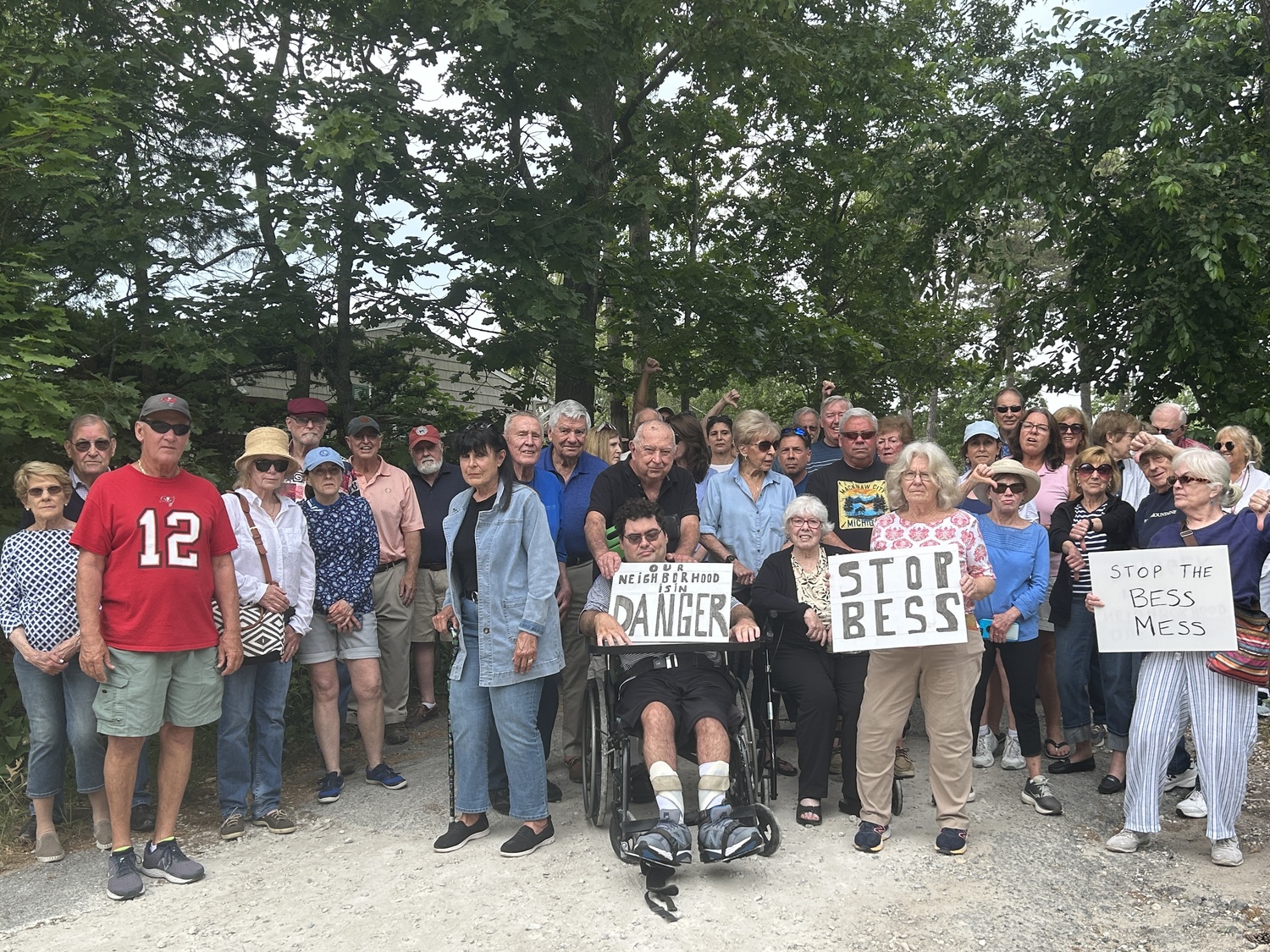
Opponents of a proposed battery energy storage system (BESS) potentially located off North Road in Hampton Bays packed a Southampton Town Hall meeting room last Thursday night, spilling over into a side conference room.
They were on hand to offer their concerns and comments during the second session of a public hearing on the Canal Southampton Battery Storage application. After close to two hours of testimony, none of it — except from the applicant’s attorney — in support, the Planning Board voted to leave the hearing open, indefinitely. There is still a lot of information the board needs, Chairwoman Jacqui Lofaro explained.
Community members alerted to the hearing had been erroneously advised there would be a vote on the matter that night. The crowd was assured that no vote would be taken, with Vice Chairman Dennis Finnerty pointing out that it was still early in the review process.
Her home on nearby Cedar Point Road was her retirement dream, Brigid Maher told planners. But it’s become “a nightmare.” Putting BESS where people live is a misstep, she said.
Bill Muir said an operative premise of the application — that its location, described as in the cloverleaf off the North Road existing from Sunrise Highway, in a remote area — is flawed.
Marion Boden also looked askance at the applicant’s assertion that the area is well suited for the project. She showed planners a map depicting over 200 homes in the vicinity of the site.
Fires and explosions are regular events at BESS sites, Muir said. He’s seen lithium fires, the 50-year resident of the community continued, and, “the word inferno is inadequate to describe this hellscape.”
If there’s a fire, “we’re all stuck,” said Josh Poulakis, whose family has owned the Hampton Maid, just down North Road from the site, for 64 years. Emil Braun echoed the worry also predicting residents would be “stuck” if disaster strikes. It shouldn’t be on Sunrise Highway or anywhere near it, he said. Speakers mentioned that a recent fire at a much smaller East Hampton BESS site halted train service and closed roads.
Beyond the fear of a fire disaster, residents also worried about the noise the facility might generate. Amy Kirwin from nearby Cedar Point Road worried about the effect of the “loud hum” the site might generate. While she, like others who spoke, expressed support for finding sustainable energy methods, “it has to be done in the right way in the right place,” Kirwin said. Lorraine Florentine wondered how the batteries would be disposed of, once they wear out.
Patricia Hammill read a letter from Elizabeth Hook, who said the Planning Board has a duty to rescind its declaration of environmental significance under the New York State Environmental Quality Review Act. The board earlier determined the project did not have the potential for a significant adverse environmental impact. A SEQRA determination may be rescinded if new information comes to the fore, Hook pointed out. She believes the request by the board for a moratorium on BESS sites that came after the SEQRA determination could provide basis for the rescinding. Last month, members of the Hampton Bays Civic Association made the same argument.
If the plan goes forward to approval, Hook said, “We will file suit.” Residents shouldn’t have to resort to legal action to get officials to listen, she wrote.
The neighborhood is in turmoil, Patricia McKee said. Many of the residents are talking about putting their houses up for sale, she said. “I’m so freaked out about this, I’m ready to pack up,” Bonnie Doyle said.
The technology is unproven, with no track record, speakers put forth, raising another objection. “I don’t want to go on fire and I don’t want to be smoked out,” Dolores Reilly said simply.
The Town of Southampton is the only one out of four or five communities on Long Island that have crafted zoning code to allow BESS facilities, Hook informed. The Town of Southampton is the only one that has written a pathway to approval for a facility the size of Canal, she pointed out, noting other municipalities recognize that a massive facility doesn’t belong in residential communities.
Tom Geinan, a retired engineer familiar with the technology, said that when he watched presentations about the application, he felt overwhelmed and wondered how the Planning Board could take it all in.
Lofaro assured, “All your letters, all your comments, all your reports, please send them to us. They are read.”
The applicant, Canal Southampton Battery Storage LLC, is seeking site plan/special exception approval for the construction of a battery energy storage unit system containing 30 battery enclosures each with 24 battery modules on a 4.9-acre property located off North Road in Hampton Bays.
Battery storage systems are part of the state’s new plan to capitalize on “green” energy, storing electricity produced by solar and wind producers to be returned to the electric grid as needed.
No date was set for the next hearing after it was adjourned.